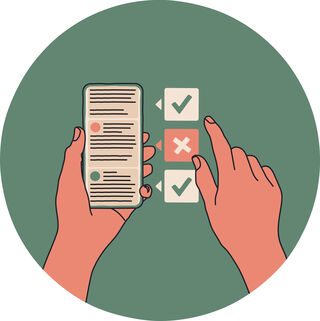Psychology
Who Is Most Vulnerable to Misinformation?
We’re still trying to understand the psychology behind misinformation.
Posted December 7, 2022 Reviewed by Tyler Woods
Key points
- Conspiracy theory research suggests that some personality types are more prone to believing in them.
- Researchers have similarly tried to figure out what might make people most prone to misinformation.
- The parameters are not clear, but it does seem that a lack of knowledge is not the main cause.
- There are some important social and psychological factors that might make someone more prone to misinformation.
False information about health, particularly about COVID-19, is a growing problem in the U.S. and throughout the world. As researchers and practitioners have tried repeatedly to intervene in this problem, a common question continues to arise: Who is most vulnerable to misinformation? Are there certain psychological or personality profiles that predict someone’s firm belief in misinformation or does it have more to do with the environment and circumstances?
While these are often methodologically difficult questions to answer, we are starting to get some clues. While in the past, there has been a more prominent idea that exposure to misinformation is often sufficient to result in a belief in it, more recently researchers have been questioning whether this is really true. Some of the research thus far suggests that people who are low in certain skills, including cognitive skills, digital literacy, and media literacy, may be most prone to misinformation.
This is by no means to say that people who believe misinformation just lack key knowledge. In fact, these factors around literacy and cognitive skills do not make up most of the reason why people probably believe in misinformation. These factors may only account for a small portion of the issue. It is most likely the case instead that a knowledge deficit is not the reason why misinformation spreads.
There are some other identity characteristics that may make someone more vulnerable to misinformation. Given previous research, it does seem to be the case that while political polarization is a risk factor for believing misinformation, people on the political right are more likely to believe in and spread misinformation than people on the political left. In addition, age and education both seem to be factors, with advanced age associated with a higher likelihood of sharing misinformation, and those with less than a high school degree displaying more vulnerability to believing fake or misleading news.

Research on identity and skills-related factors that predispose certain individuals to believing in and spreading misinformation is helpful, but it still leaves an open question about whether there are certain psychological or personality factors at play here.
In the conspiracy theories field, there has been some useful research tying certain personality traits, such as narcissism, and certain psychological features, such as feelings of loneliness and isolation, to a greater chance of believing in conspiracy theories. But are any of these psychological and personality factors relevant to vulnerability to misinformation as well?
While research on vulnerability to misinformation is mostly still in its infancy, some have suggested that common psychological factors present in childhood may affect adult life in ways that make some people more susceptible to believing misinformation. In general, childhood beliefs tend to be challenged as people get older, but there is a strong emotional inclination to hold onto beliefs from our childhoods that allows us to maintain family peace. As children learn to come up with rationalizations for their firmly-held beliefs and maintain them in the face of challenges, confirmation bias (the tendency to seek out information that agrees with what we already believe) muscles get strengthened all the way into adulthood.
The less challenged a child is about his or her beliefs, the more he or she will excel at coming up with rationalizations that chase away alternative ideas. On the contrary, when children are actively taught skepticism and critical thinking, their confirmation bias “muscle” gets a little weaker. In addition, people with high levels of anxiety are often more prone to confirmation bias, in part because they have a tendency and a strong inclination to block out new information that might be in any way threatening.
Belonging to a social group that believes in a certain type of misinformation might also strengthen the misinformation muscle. Disengaging from this belief can threaten people’s identity and group membership, so we find ways to hold onto it, even when disconfirming evidence comes along.
While our understanding of vulnerability to misinformation is still evolving, there are some factors that we can attend to now. For example, teaching skepticism and critical thinking to young people is always a useful venture. In addition, recognizing that people sharing misinformation might be particularly anxious or trying to defend a deeply-held belief can help build empathy and necessitates a response that is compassionate and understanding. We will never get very far in the fight against misinformation if we don’t truly understand where it is coming from, how it spreads, and who is most susceptible. We have a long way to go in understanding this, but we should take to heart the progress we have made thus far.


